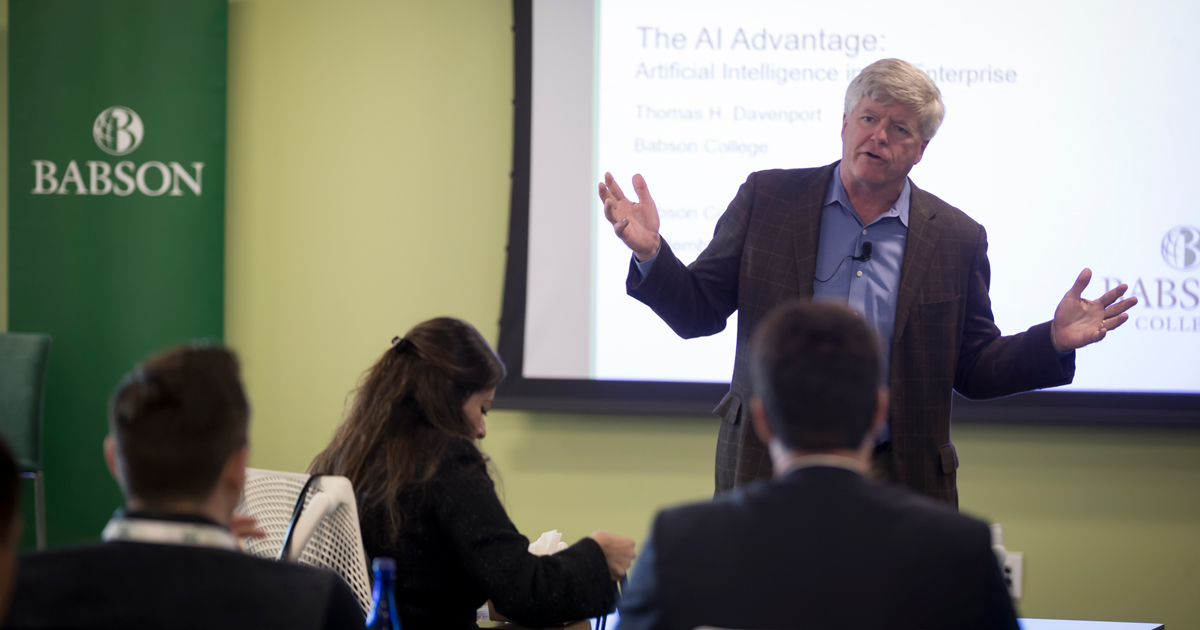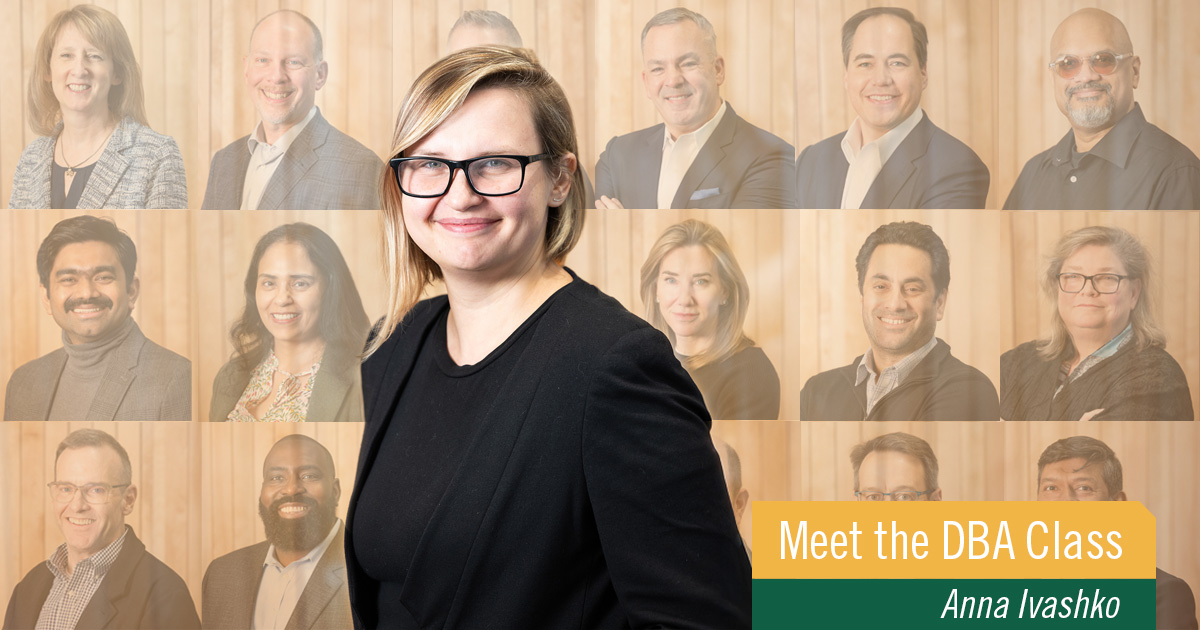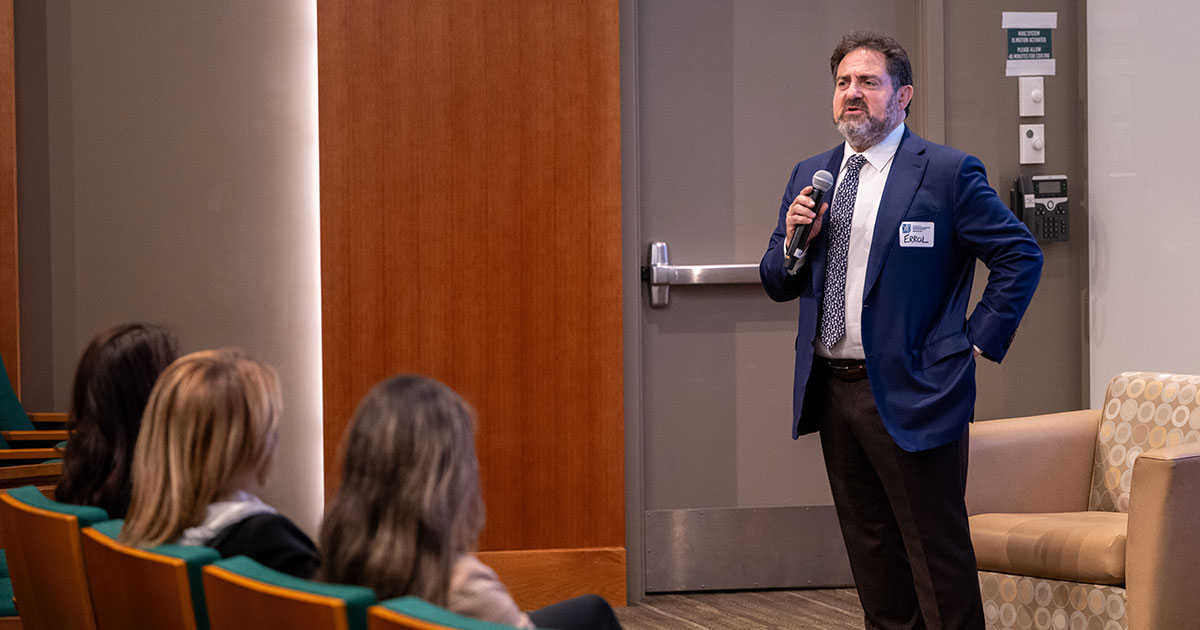The AI Advantage

“Artificial intelligence is often considered magic,” says Professor Tom Davenport, addressing a crowd at Babson’s Boston location during the recent Centennial Celebration. “Companies think it can transform their businesses overnight.”
Davenport, the President’s Distinguished Professor of Information Technology, is an AI expert, thanks to his research and work with large enterprises. According to him, these moonshot applications of AI don’t typically work out very well. Instead, Davenport says what really works is lots of low-hanging fruit. “Jeff Bezos calls it quietly but meaningfully improving core operations,” says Davenport, who describes it more succinctly as “boring AI.”
There’s little doubt that artificial intelligence is here to stay. “We’ve had peaks and valleys, winters and springs, but I think a sort of permanent spring is upon us,” he says.
What Is Artificial Intelligence?
Davenport thinks of AI as a collection of technologies. Some are very statistical, like business analytics on steroids. Others, like the AI that powers internet chatbots, are semantic. Some are more logic and rules-based. “Increasingly, you’re going to see combinations of these,” he says. “Five years from now, every AI application will have multiple pieces of various types combined within an application.”
The most common form of AI is machine learning. According to Davenport’s research, 63 percent of large U.S. companies say they’re using machine learning, including deep learning. About 62 percent are using natural language processing, and 49 percent are using something called robotic process automation, which he describes as “the dumbest approach to AI that we have today, but the fastest growing.”
Reskilling, Not Replacing
“I’ve done a number of surveys of what people want to accomplish with AI and there’s a pretty broad range,” Davenport says. “You mostly read about the idea of automating humans out of jobs. The good news is that there’s not much evidence that this is happening so far to humans.”
He points to Amazon, which is spending $700 million to reskill its distribution center employees. The hope is that by the time warehouses are fully automated, these people will still have meaningful work. “I don’t think we’re going to see massive unemployment because of AI,” says Davenport, “but we are going to see massive job changes.” His advice? “Start thinking now about how to reskill your organization.”
Winning with AI
According to Davenport’s survey findings, the most common AI objective within enterprises is improving products and services. This could look like making a mortgage product smarter so less data needs to be collected from the customer, for example. Or, it could be improving the decision making around issuing credit. Maybe it’s a new tech product that AI makes easier to use, or even just upgrading internal processes within an organization.
Davenport is quick to list companies who are winning with AI. Vanguard, one of the biggest asset management companies in the United States, uses AI to power its robo advisor. While it stops short of recommending individual stocks and bonds, it does alert customers about rebalancing their portfolios, or warn them if their retirement savings aren’t keeping pace for their age. More than $115 billion is managed this way, and at less than half of what it previously cost to work with a human advisor.
Pharmaceutical giant Pfizer uses AI to identify new drug targets and sell more effectively. Capital One has more than 1,000 AI projects, including an AI-powered chatbot named Eno. Chinese conglomerate Ping An uses AI across its businesses, employing more than 1,000 AI specialists. According to Davenport, Ping An is “probably the single most aggressive financial services company I have found in the world in terms of their use of this technology, and very financially successful and growing extremely rapidly.”
Expert Advice
For Davenport, artificial intelligence isn’t a technology that lends itself well to being a fast follower. “It takes too long to gather the data, learn from the data, get the people on board who know how to analyze it,” he says. “If you really care about the success of your business, the time is now to really be pursuing this technology.”
Of course, Davenport’s advice doesn’t come without a caveat or two. “Think big but start small,” he says. “Have a vision for where you want to go with these technologies, but implement it piece by piece. Think about how you’ll reskill your workers. And most of all, put somebody in charge of AI and think from the beginning about the ethical issues you may encounter.”
Posted in Insights



